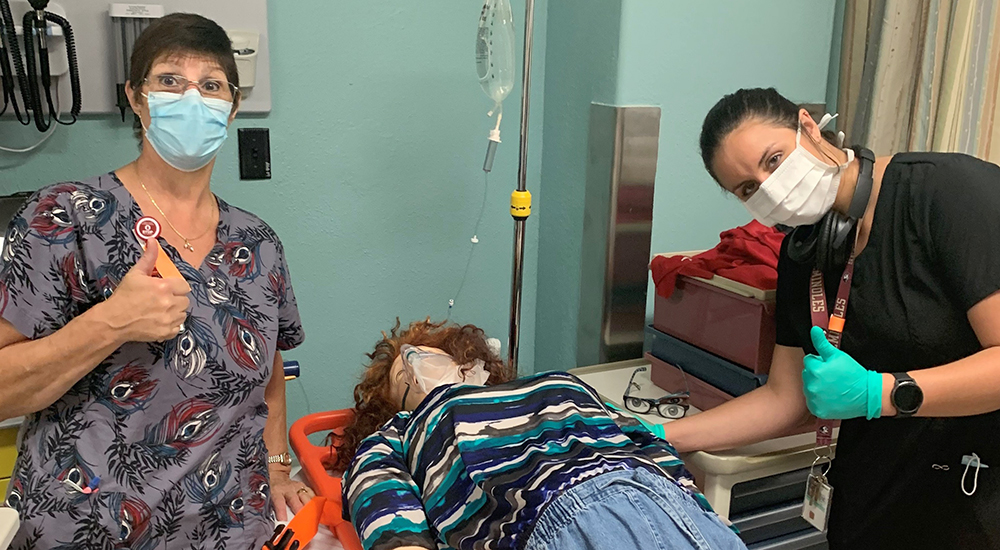When emergencies happen, VA’s frontline health care workers step up to meet the challenges. This often means relying on skills and training they may not often use.
Thanks to VA’s Simulation Learning, Education and Research Network (SimLEARN), VA providers can keep their skills sharp and maintain readiness for any situation.
SimLEARN, based in Orlando, is an innovative training program that helps VA providers and front line staff practice skills in a safe learning environment that simulates real-life situations. Through a variety of face-to-face and virtual courses, direct care providers can practice foundational skills they might not get to use very often.
This helps ensure doctors, nurses and other providers can confidently respond to life-threatening situations when they happen.
Keeping skills sharp and ready for any situation
“I think Veterans can appreciate the extensive training SimLEARN offers because of their past military experience,” said Lygia Arcaro, SimLEARN’s national director of nursing programs. “You know that saying, ‘Train the way you fight?’ That is what we are encouraging health care workers to do in our program. Train with the staff you work with so you perform better in the field.”
Arcaro has been with the program since its inception in 2010. She has seen SimLEARN’s programs become a “force multiplier” for provider readiness, training staff who in turn return to their facilities and become champions for these skills locally.
SimLEARN’s vision over the last 10 years has been to improve Veteran health care outcomes by establishing VHA as a global leader in health care simulation-based training and research. Each initiative has better equipped nurses and doctors to save lives.
Trauma Nursing Corps Course (TNCC), one of SimLEARN’s most successful programs, teaches emergency nurses how to use a standardized process to quickly assess a patient and make safer, faster calls about life-saving intervention. Through this two-day course, VA nurses are better able to identify Veteran injuries more quickly.
More than 1,000 nurses trained by the end of September
Susan Martenson, SimLEARN’s TNCC coordinator, works with the Emergency Nurses Association to train VA nurses as trauma nurse educators. “By the end of September, more than 1,000 VA nurses will have successfully completed this course,” she said. These credentialed trainers then return to their facilities to lead courses locally.
Another important SimLEARN program is the Resuscitation Education Initiative (REdI), which evaluates training platforms to support VHA resuscitation training needs. REdI provides oversight and support through standardized basic, advanced, pediatric and non-clinical (layperson) resuscitation training, tracking, and monitoring using advanced, responsive mannequins.
The mannequins have human-like qualities that provide real-time feedback to trainees. Those qualities include having a pulse, sweating, foaming at the mouth, urinating and vomiting.
In the photo above, two nurse trainees practice their resuscitation skills with life-like mannequin to increase their readiness.
“This type of training means front line providers have the necessary skills to respond to a medical emergency anytime, anywhere. Even people who have been resistant to training have developed the confidence and skill sets to save a life,” said Lisa Baker. Baker is the national program director for REdI.
Learn more about SimLEARN.
This blog is part of a VA series recognizing 2020 as the International Year of the Nurse and Midwife. VA salutes the more than 100,000 VA nurses who work tirelessly every day to serve Veterans across the country. VA nurses are committed to taking care of Veterans, bringing comfort and hope to thousands of patients 24/7/365. We invite you to show your support for these everyday heroes and thank a nurse at your next appointment!
VHA Office of Communications contributed to this story.
Topics in this story
More Stories
Watch the Under Secretary for Health and a panel of experts discuss VA Health Connect tele-emergency care.
The 2024 National Veteran Suicide Prevention Annual Report provides the foundation for VA’s suicide prevention programs and initiatives.
Theranostics is a specialized field of nuclear medicine that uses a two-pronged approach to diagnose and treat cancer.






